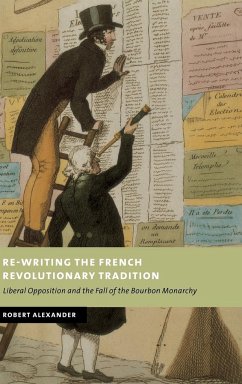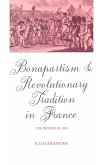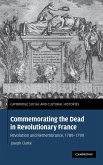Short description/annotation
This book examines the politics of the French Revolutionary tradition in the early nineteenth century.
Main description
This book examines the politics of the French Revolutionary tradition during the Bourbon Restoration and early July Monarchy. Robert Alexander argues that political change was achieved by legal grassroots organisation and persuasion - rather than by the revolutionary tradition of conspiracy and armed insurrection. Moreover, political struggle was not confined to the elite, as common material values linked the electorate to those deprived of the power to vote. Battle between advocates of national and royal sovereignty constituted the principal dynamic of the period, and fostered significant developments in party formation previously unrecognised by historians. To substantiate his claims, the author analyses relations among the Liberal Opposition, ultraroyalists and the state, concluding that although Liberals triumphed in the 1830 Revolution, thereafter they contributed to the destabilisation that produced an immobile Orleanist regime. Nevertheless, they had pioneered a model for change which could successfully adapt pursuit of reform to longing for civil order.
Table of contents:
Introduction: open questions; 1. False starts and uncertain beginnings, from the first Restoration (May 1814) to the elections of September 1816; 2. Battle commences, from September 1816 to July 1820; 3. Self-defeating opposition, from July 1820 to February 1824; 4. Back on track, from March 1824 to January 1828; 5. Towards victory(?)33; January 1828 to July 1830; 6. Aftermath: liberal opposition and the July Revolution; Conclusion: revolutionary tradition.
Hinweis: Dieser Artikel kann nur an eine deutsche Lieferadresse ausgeliefert werden.
This book examines the politics of the French Revolutionary tradition in the early nineteenth century.
Main description
This book examines the politics of the French Revolutionary tradition during the Bourbon Restoration and early July Monarchy. Robert Alexander argues that political change was achieved by legal grassroots organisation and persuasion - rather than by the revolutionary tradition of conspiracy and armed insurrection. Moreover, political struggle was not confined to the elite, as common material values linked the electorate to those deprived of the power to vote. Battle between advocates of national and royal sovereignty constituted the principal dynamic of the period, and fostered significant developments in party formation previously unrecognised by historians. To substantiate his claims, the author analyses relations among the Liberal Opposition, ultraroyalists and the state, concluding that although Liberals triumphed in the 1830 Revolution, thereafter they contributed to the destabilisation that produced an immobile Orleanist regime. Nevertheless, they had pioneered a model for change which could successfully adapt pursuit of reform to longing for civil order.
Table of contents:
Introduction: open questions; 1. False starts and uncertain beginnings, from the first Restoration (May 1814) to the elections of September 1816; 2. Battle commences, from September 1816 to July 1820; 3. Self-defeating opposition, from July 1820 to February 1824; 4. Back on track, from March 1824 to January 1828; 5. Towards victory(?)33; January 1828 to July 1830; 6. Aftermath: liberal opposition and the July Revolution; Conclusion: revolutionary tradition.
Hinweis: Dieser Artikel kann nur an eine deutsche Lieferadresse ausgeliefert werden.








